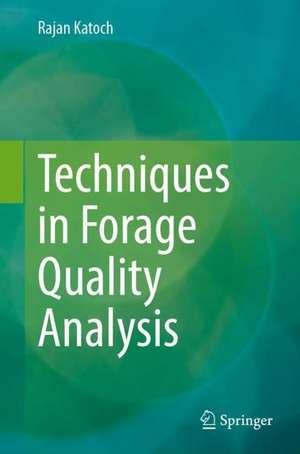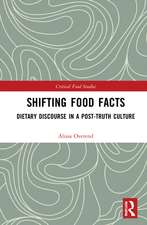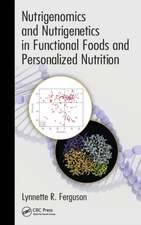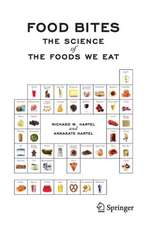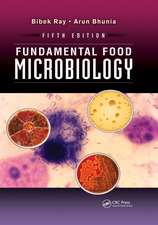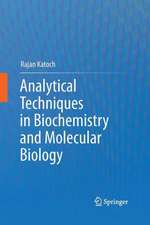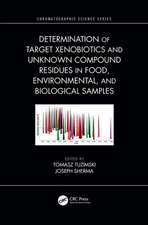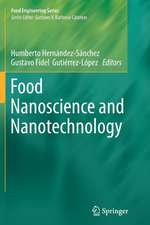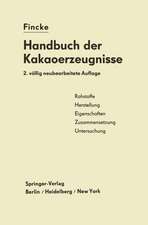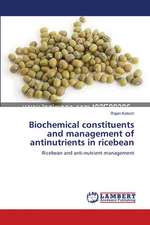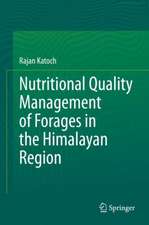Techniques in Forage Quality Analysis
Autor Rajan Katochen Limba Engleză Hardback – 28 noi 2022
| Toate formatele și edițiile | Preț | Express |
|---|---|---|
| Paperback (1) | 942.44 lei 43-57 zile | |
| Springer Nature Singapore – 28 noi 2023 | 942.44 lei 43-57 zile | |
| Hardback (1) | 948.47 lei 43-57 zile | |
| Springer Nature Singapore – 28 noi 2022 | 948.47 lei 43-57 zile |
Preț: 948.47 lei
Preț vechi: 1156.67 lei
-18% Nou
Puncte Express: 1423
Preț estimativ în valută:
181.48€ • 189.100$ • 150.17£
181.48€ • 189.100$ • 150.17£
Carte tipărită la comandă
Livrare economică 07-21 aprilie
Preluare comenzi: 021 569.72.76
Specificații
ISBN-13: 9789811960192
ISBN-10: 9811960194
Pagini: 233
Ilustrații: XVII, 233 p. 1 illus.
Dimensiuni: 155 x 235 mm
Greutate: 0.53 kg
Ediția:1st ed. 2023
Editura: Springer Nature Singapore
Colecția Springer
Locul publicării:Singapore, Singapore
ISBN-10: 9811960194
Pagini: 233
Ilustrații: XVII, 233 p. 1 illus.
Dimensiuni: 155 x 235 mm
Greutate: 0.53 kg
Ediția:1st ed. 2023
Editura: Springer Nature Singapore
Colecția Springer
Locul publicării:Singapore, Singapore
Cuprins
1. Introduction.- 2. Forage quality vis-a vis livestock productivity.- 3. Forage Quality Indices.- 4. Forage quality components.- 5. Management of anti-nutrients in forages.- 6. General scheme for forage quality analysis.- 7. Laboratory essentials for forage evaluation.- 8. Solutions and buffers in estimations.- 9. Estimation of nutritional components in forages.- 10. Estimation of anti-quality and anti-nutritional factors in forages.- 11. Estimation of mineral content in forages.- 12. Estimation of phytochemicals and enzyme activities in forages.- 13. Quality Estimation of Natural Grasslands and Pastures. 14. Nutritional Quality of Important Forages.- 15. Conservation and processing of forages.- 16. Factors Affecting Forage Quality.- 17. Forage Nutritional Quality Management.
Notă biografică
Dr. Rajan Katoch is presently working as a Principal Scientist at CSK Himachal Pradesh Krishi Vishvavidyalaya, Palampur, India. He has more than 25 year’s of research experience in the field of Biochemistry and Molecular biology. He is actively involved in research on nutritional evaluation of forages and has headed more than ten research projects sponsored by prestigious organizations. He has received several prestigious awards and honors, such as the Young Scientist Award, award from CSIR, Government of India for excellence in biochemistry, Group Study Exchange (GSE) fellowship from South America (Brazil), ICAR fellowship, and DBT Crest Award. He has also received “appreciation award” from the United States Department of Agriculture (USDA) for his exemplary work on rice bean protease inhibitor as a transgene for resistance. He has the credit of nutritional profiling of major grasses, legumes, fodder trees, and nonconventional forage resources of Indian Himalayas. He isa fellow and member of various professional societies. He has published over 100 papers in high impact peer-reviewed international and national journals and has authored ten successful books with prestigious publishers..
Textul de pe ultima copertă
The book covers different techniques and methodologies involved in the nutritional quality analysis of forages. It also discusses the nutritional quality, anti-nutritional components, factors affecting forage quality, feed processing and conservation. Different techniques and methodologies have been presented in a simplified manner. The book has been divided in separate chapters and each chapter discusses different aspect of forage quality. Further, the book also covers the topics on conservation and processing of forages and management techniques for improving the forage nutritional quality. This book is an essential source of information for research scholars, post-graduate students and scientists working on forage quality estimation and also in livestock and dairy industries.
Caracteristici
Presents techniques for nutritional evaluation of forages Examines management techniques for improving forage nutritional quality Discuss techniques for estimation of minerals and anti-nutrients in forage
